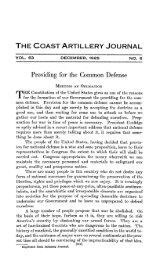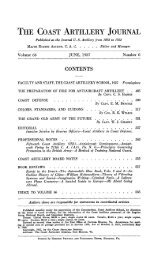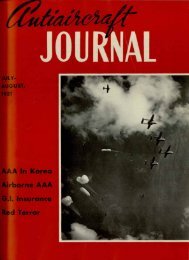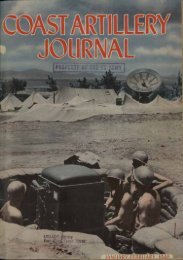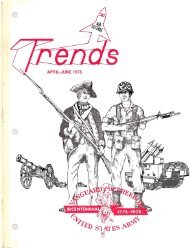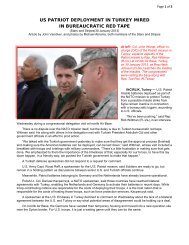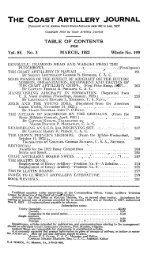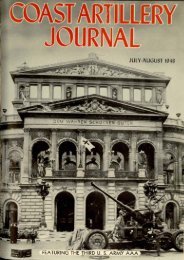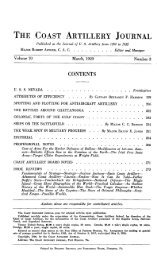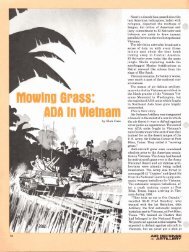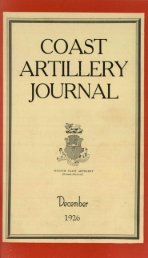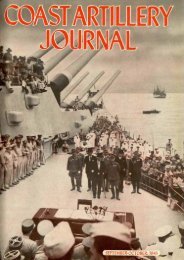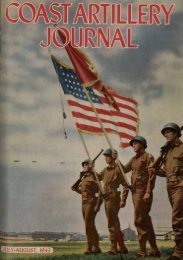COAST. I ARTILLERY JOURNAL, - Air Defense Artillery
COAST. I ARTILLERY JOURNAL, - Air Defense Artillery
COAST. I ARTILLERY JOURNAL, - Air Defense Artillery
Create successful ePaper yourself
Turn your PDF publications into a flip-book with our unique Google optimized e-Paper software.
492 THE <strong>COAST</strong> <strong>ARTILLERY</strong> <strong>JOURNAL</strong><br />
the noon halt was reached. Here hot tea was served to the men from the fireless<br />
cookers which are a part of the mountain battei"y's equipment, and the horses<br />
were also fed. It is a rule in the Swiss Mountain <strong>Artillery</strong> to save up both rations<br />
and forage so that extra meals may be given to both men and animals on long<br />
climbs through the mountains.<br />
Following three hours of steep descent, the command reached the lower<br />
ground at six o'clock with thirteen kilometers to go to the objective of the day's<br />
march. After an hour's halt for supper for the men and animals, the last stage<br />
was made to the night's camp, which was reached at 10:00 P. M. by the last battery,<br />
making a total day's march of seventeen hours including two halts of an<br />
hour each. The command bivouacked for the night on a grassy plot near the railway<br />
station, the officers being quartered in several of the small hotels. Marching<br />
into camp, the batteries were reviewed by the commander, the young recruits<br />
executing "eyes right" with a grimness and determination which provoKed most<br />
favorable comment from the observers. Not a man had fallen out and the only<br />
casualties had been one horse killed and one severely wounded_<br />
The second day's march was over a mountain road paralleling a valley and was<br />
of some twenty kilometers in length. After reveille at 7:00 A. :\1., the morning<br />
hours were devoted to cleaning equipment and preparing for the march which was<br />
begun at 11 :00 A. :\1., the objective being reached at 4 :30 P. :\1. The heat was very<br />
oppressive and little air -was stirring so that the men and animals suffered more<br />
fatigue on this day's march than on the much longer one of the first day.<br />
The unusually good comradship existing between the officers and men of the<br />
Swiss Army was illustrated by several instances of the officers assisting tired men<br />
with their packs and rifles. The noon meal this day, carried as usual in the fireless<br />
cookers, consisted of oatmeal soup, supplemented by bread and raw bacon<br />
carried in the men's haversacks. Raw bacon is considered a great delicacy by<br />
the Swiss.<br />
The third day's march, over a difficult pass, was begun in the cool of the<br />
morning at 5:00 A. :\1., the ascent being comparatively easy, but the descent extremely<br />
difficult as the trail was narro-w and so muddy and in places so rocky<br />
that at first sight it did not seem possible to get the animals down without<br />
accident. In the descent. the two "steering straps," fastened on to the rear part of<br />
the horses' harness and held by one and in some cases by two follow-up men, -were<br />
the only means of saving the animals from losing their balance and toppling headforemost.<br />
The trail was much too narrow to permit the guns to be set up so that<br />
the heavy -weights had to be carried by the animals for the entire distance. Camp<br />
was reached at 2:30 P. :\1.<br />
The fourth march was expected to be so difficult that a working party of six<br />
officers and forty men was sent out at 5:00 P. :\1. The next morning a hea.,y rain<br />
-was falling which greatly hampered the work of preparing the trail and of ad-<br />
vancing supplies for crossing the pass. Convoys -were sent up to the advance base<br />
both morning and afternoon. every horse and mule carrying two bales of straw<br />
(90 pounds each) or hay 1100 pounds each) or its equivalent. By noon next day<br />
all the stores for the crossing had been aceumulated at the advance base.<br />
The following morning the passage of the pass "as commenced. The ascent<br />
was so arranged that the gunners of the third battery should accompany and<br />
assist the leaders of the leading battery, while the gunners of the leading battery<br />
should descend and assist the leaders of the third battery, while both joined in<br />
assisting the intermediate battery. In addition to these general precautions, six



